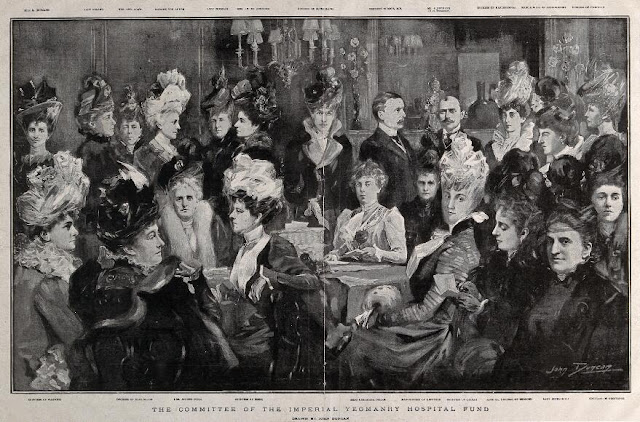Katherine Blanche Brereton was born into a prominent landowning family in Norfolk in 1861. Like her fellow Committee member, Lucy Deane, she had connections to the upper classes and the military. Her father, Shovell Henry Brereton, had served in the Norfolk Militia and her grandfather had once been the vicar of the English church at Versailles. Her brother, Cloudesley Shovell Henry Brereton, became a respected poet, translator and educator.
Katherine's father was opposed to her dream of becoming a nurse and she was nearly 30 years old before she defied him, left the comforts of Briningham Hall and commenced training as a "lady pupil" nurse at Guy's Hospital in London. She became the head sister of the Bright Ward (named in honour of Richard Bright who was an early pioneer in kidney research).
 |
| Briningham Hall Wikimedia Commons |
She also worked at the Birkenhead and Wirrall Children's Hospitals and trained in midwifery at the York Road Lying-In Hospital. Katherine returned home to Norfolk in late 1899 when her father died suddenly after falling from his horse during a hunt. A short time later in 1900 she joined the nursing section of the Royal Army Medical Corps and sailed out to the war in South Africa.
Katherine was involved in the establishment of hospitals at Pretoria and Elandsfontein, and served as night superintendent at the Imperial Yeomanry Hospital at Deelfontein.
 |
| The imperious ladies of the Imperial Yeomanry Hospital Fund Committee Wellcome Collection |
 |
| Unnamed nurse and patients at Deelfontein Wellcome Collection |
 |
| Another unnamed nurse and patient in a bed donated by Queen Alexandra for use at Deelfontein Wellcome Collection |
Apart from her important English establishment connections, it was her experience in the hospitals that resulted in Katherine receiving a letter from the War Office requesting her to join the Ladies Committee to investigate the conditions in the concentration camps. She became a good friend of Millicent Fawcett and joined forces with her again in 1903 on a special mission to promote the conciliation of Boers and Britons.
After she returned permanentlyhome to England, Katherine often gave talks about her nursing experiences and being a member of the Ladies Committee investigating the concentration camps. (There are several reports on her talks in British Newspaper Archives). But she was always diplomatic and careful not to be overly critical of the camps or British policy in their operation.
Katherine's medal record for the Boer War shows she received the Queen's South Africa Medal and Clasp and also the highest nursing honour of the Royal Red Cross which she received at an investiture by King Edward VII in December, 1902.
 |
| These are not Katherine's medals, but she would have had a similar set, including the Royal Red Cross and Anglo-Boer war medals |
Katherine spent the remainder of her life in Norfolk where she managed the family's estates and set herself to master the farming of several hundred acres. She also devoted herself to public work, was President of the Holt Suffrage Society (later the National Women Citizens Association), also became a Justice of the Peace, served as a magistrate and was involved in numerous other causes. It seems she was also an avowed member of the Temperance Movement and may have not gained popularity by being instrumental in closing her local village pub!
When she died in October, 1930, she left her body to medical research. Her obituary in the feminist newspaper "Common Cause" sums her up as follows.
"Her useful life of remarkably interesting and varied forms of service has come to an end; of her it may be said in the words proposed for the tablet to be erected in her memory: 'She asked nothing; she gave all'"
Sadly, there are no accessible images of Katherine Brereton to be found online although there must be some in family collections or records of the many organisations in which she was involved.
Bed hangings belonging to her ancestors were donated by her in 1929 to the Norwich Museums. Read about them in the following links.
Personal library sources include:
"The Concentration Camps of the Anglo-Boer War, A Social History" by Elizabeth Van Heyningen
"Rebel English Woman, The Remarkable Life of Emily Hobhouse" by Elsabe Brits
"The Compassionate Englishwoman" by Robert Eales
"The Boer War" by Thomas Pakenham
"Those Bloody Women, Three Heroines of the Boer War" by Brian Roberts
No comments:
Post a Comment